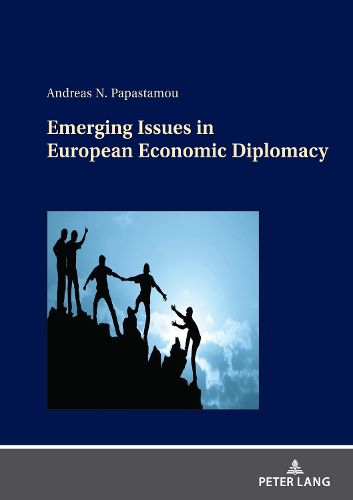Readings Newsletter
Become a Readings Member to make your shopping experience even easier.
Sign in or sign up for free!
You’re not far away from qualifying for FREE standard shipping within Australia
You’ve qualified for FREE standard shipping within Australia
The cart is loading…






This title is printed to order. This book may have been self-published. If so, we cannot guarantee the quality of the content. In the main most books will have gone through the editing process however some may not. We therefore suggest that you be aware of this before ordering this book. If in doubt check either the author or publisher’s details as we are unable to accept any returns unless they are faulty. Please contact us if you have any questions.
Economic diplomacy is a multifaceted tool that European countries, both individually and collectively through the EU, use to promote their economic interests, enhance their global standing, and address pressing global challenges. In his book, Andreas N. Papastamou, Professor of European Economics and Economic Diplomacy, who served as an economic diplomat at the Ministry of Foreign Affairs of Greece for 23 years, analyses contemporary challenges of economic diplomacy, from the impending reconstruction of Ukraine and the response to increasingly frequent international geopolitical shocks, to the relationship between the promotion of states' commercial interests and development cooperation and human rights.
The book has six chapters, covering major challenges of economic diplomacy for the European Union. The first chapter is a fruitful overview of the history of economic diplomacy from the cultures of antiquity to the 21st century, with the contemporary challenges of globalization, digitalization and sustainable development. The second chapter examines the means available to economic diplomacy in Europe to deal with increasingly frequent international geopolitical shocks. The third chapter highlights the plans of European institutions and states for the post-war reconstruction of Ukraine. The fourth chapter examines the sensitive aspects of trade diplomacy and development cooperation with human rights. The fifth chapter focuses on the training of economic diplomacy officers and the sixth chapter on the role of European universities in dealing with economic crises.
$9.00 standard shipping within Australia
FREE standard shipping within Australia for orders over $100.00
Express & International shipping calculated at checkout
This title is printed to order. This book may have been self-published. If so, we cannot guarantee the quality of the content. In the main most books will have gone through the editing process however some may not. We therefore suggest that you be aware of this before ordering this book. If in doubt check either the author or publisher’s details as we are unable to accept any returns unless they are faulty. Please contact us if you have any questions.
Economic diplomacy is a multifaceted tool that European countries, both individually and collectively through the EU, use to promote their economic interests, enhance their global standing, and address pressing global challenges. In his book, Andreas N. Papastamou, Professor of European Economics and Economic Diplomacy, who served as an economic diplomat at the Ministry of Foreign Affairs of Greece for 23 years, analyses contemporary challenges of economic diplomacy, from the impending reconstruction of Ukraine and the response to increasingly frequent international geopolitical shocks, to the relationship between the promotion of states' commercial interests and development cooperation and human rights.
The book has six chapters, covering major challenges of economic diplomacy for the European Union. The first chapter is a fruitful overview of the history of economic diplomacy from the cultures of antiquity to the 21st century, with the contemporary challenges of globalization, digitalization and sustainable development. The second chapter examines the means available to economic diplomacy in Europe to deal with increasingly frequent international geopolitical shocks. The third chapter highlights the plans of European institutions and states for the post-war reconstruction of Ukraine. The fourth chapter examines the sensitive aspects of trade diplomacy and development cooperation with human rights. The fifth chapter focuses on the training of economic diplomacy officers and the sixth chapter on the role of European universities in dealing with economic crises.